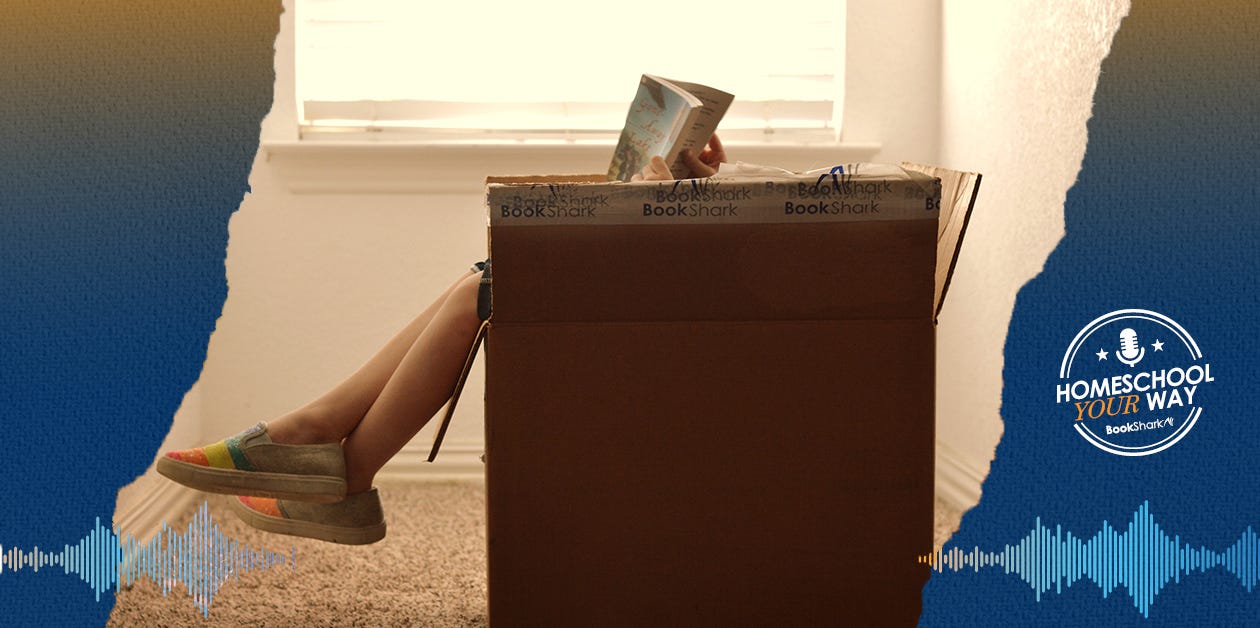A Mindful Homeschool: How to Respond Instead of React
-
 By
Ginny Kochis
By
Ginny Kochis
- Feb 7, 2022

The day has not gone well. You were ten minutes late for a doctor's appointment. They cancelled and moved your appointment to next week. You fought with the oldest about her math lesson. The toddler destroyed your homeschool planner while you were busy with his sibling. You washed three loads of laundry and carried it upstairs. The muddy dog came in and took a nap in the basket. You just got a text about book club tomorrow. They’ve asked you to lead discussion on a book you’ve never read.
It’s 5 PM. A blinking light on the slow cooker reveals it was never plugged in; your ingredients for dinner are now destined for the trash. The kindergartner is crying, the house is a mess, and the oldest is due on the soccer field in less than an hour.
And then there’s a call from the bedroom upstairs:
“Moooooooooommmmmmmm!!!!!!! We’re gonna need a huuuuuuge towelllllll!!!!”
“SHHHHHH!!!!! Don’t tell her that! If we just shove it over here she’ll never notice!!!!!”
The Psychology of Response
Our brains are wired to respond to stimuli. We take information, process it, and decide how to proceed with the input we’re given. Most of the time our responses are quick, especially in stressful or contentious situations. It’s easy to react without pausing to think—to snap out of anger or gripe from frustration.
Reacting in rage is common and human, especially after a day like the one up above. But its mindful and gentle counterpart, responding, is ultimately the better (though more difficult) option.
It’s an approach popularized by the late Zig Ziglar, a difference he highlighted during an oft-quoted presentation:
“You get sick and go to the doctor. Chances are good that after an examination, she would give you a prescription with instructions to return in several days. If, when you walk back in the door, the doctor starts shaking her head and says, “It looks like your body is reacting to the medicine; we’re going to have to change it,” you probably would get a little nervous. However, if the doctor smiles and says, “You’re looking great! Your body is responding to the medication,” you would feel relieved.”
“Yes,” Ziglar says, affirming his position: “responding to life is good.”
Responding to the needs and behaviors of children is good. It lowers global stress levels, strengthens relationships, and builds a sense of trust between parent and child.
When we react, we end up with hurt feelings, at best and damaged relationships at worst. When we respond, we respect individual needs and assure our children of unconditional support.
How to Respond Instead of React
 The hardest part of learning to respond is the breaking of ingrained habits. Most of us have spent a lifetime reacting, and the development of new behaviors takes time and hard work. Mindfulness—the ability to focus and respond to the present moment—will go a long way toward a tendency of measured response. Here are ways to develop a habit of emotional response in your day to day homeschool life:
The hardest part of learning to respond is the breaking of ingrained habits. Most of us have spent a lifetime reacting, and the development of new behaviors takes time and hard work. Mindfulness—the ability to focus and respond to the present moment—will go a long way toward a tendency of measured response. Here are ways to develop a habit of emotional response in your day to day homeschool life:
1. Pause
The moment you experience an inciting event, take a step back and breathe. Exhale as though you are inflating a beach ball: a long, slow breath should lessen the tension. If you find yourself in need of concrete relief, try blowing bubbles or brewing a pot of tea. The gigantic mess or behavior issue isn’t going anywhere, and it benefits everyone when you stop to calm down.
2. Consider
While you are pausing, think deeply about the situation you’re facing. What are the global emotions at play? Is there an underlying cause for the inciting event? In the case of behavior problems or issues, a desire to be bad is rarely the cause. A child’s tantrum or negative, disruptive actions are typically indicative of an unmet need. How can you respond to the child in such a way that you address the need while correcting the behavior?
3. Respond
Responding in no way negates a consequence. It merely means you present it with love. Rather than lose your temper or send a child to time out, your response involves the offender in the resolution. Reassure the child of your unwavering support, then firmly and gently correct the behavior. If the resolution requires assistance from an adult, work with the child until she can handle it on her own.
Setting a Mindful Precedent
In parenting, homeschooling, and life in general, it’s helpful to develop a tendency toward response. Rather than act immediately with a knee-jerk reaction, taking a breath to consider will be more beneficial in the long run. Some days of homeschooling are hard, and our patience runs out. But the ability to approach a challenge with love will not only defuse a potential explosion; it will set a precedent for less conflict as the days go on.

About the Author
Ginny Kochis is a former high school English teacher and adjunct professor of English turned homeschooling mom and business owner. She writes about faith, motherhood, homeschooling and family literacy at Not So Formulaic.









